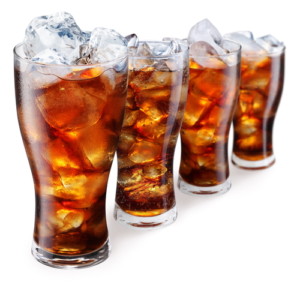Soda, what is the problem consuming them
 Soda, or soft drinks, come in many types. Most contain sugar, and some are “diet” sodas. Most soda contains caffeine. All sodas contain excess phosphorus and carbon acids. So what are the problems here?
Soda, or soft drinks, come in many types. Most contain sugar, and some are “diet” sodas. Most soda contains caffeine. All sodas contain excess phosphorus and carbon acids. So what are the problems here?
Phosphorus
Phosphorus is a necessary component of bone, but excessive intake blocks calcium absorption. Too much phosphorus binds with calcium in your blood, thus making calcium unavailable for your body’s functions. Your body senses that it doesn’t have enough calcium in the blood takes it from your bones. Calcium is important for many things, including normal heartbeat, nerve and muscle function and blood clotting, including the formation of hard bones and teeth.
There should be an even amount of phosphorus and calcium in your diet. Your phosphorus intake is increased when drinking soft drinks, and this depletes your body of calcium and magnesium.
Some researchers believe that calcium is first robbed not from your hips or spine, but from your jaw, leading to tooth loss.
Caffeine
A lot of soda contains caffeine. Caffeine consumption increases the urinary excretion of calcium. Thus, you have less calcium in your system. Caffeine also has other liabilities. See our article for more information: Caffeine
Sugar
When you drink soda, you intake sugar at a rate of about 3 grams per ounce. Soda delivers sugar without the B vitamins that enable the body to turn sugar into energy. Soda has empty calories. You have to eat more food at other meals to make up for the nourishment that the sugar in soda lacks. For more information on sugar, see our article: Sugar
“Diet Soda”, without sugar, Diet sodas do not have sugar, but have artificial sweeteners. Read our article: Aspartame is the most common sweetener used in soft drinks.
There have been cases where persons typically drinking quarts of diet soda, finding that the artificial sweeteners contribute to compulsive eating. You may have noticed that your cravings for sweets and fatty foods, and your weight, have increased along with artificial sweetener use. One person announced that when they had given up diet sodas, they suddenly lost 10 pounds.
Carbon Acids
The carbon acids contained in soda increase the acidity of the blood. The regulation of the blood’s pH – making it more acidic when it becomes too alkaline and vice versa – is an example of a homeostatic mechanism: a means of balancing opposing tendencies to maintain the correct equilibrium for the continued functioning of the organism. Zinc is important if many of the homeostatic mechanisms, including regulation of blood pH. Thus, zinc is needed for this balance.
The cans that most soda comes in
It is a bad idea to use aluminum. Too much aluminum can cause bone to loss. The aluminum not only can bind with phosphorus and calcium, drawing them into the urine, but also deposits them on bones, causing osteomalacia (soft bones). Although the aluminum used in soda is covered with a plastic, there is some question if it doesn’t get into the soda anyway.
What should I take
Calcium/Magnesium: Calcium is best taken with magnesium. It is best on a 3:1 ratio. In other words, for every 300 mg of calcium, you need 100 mgs of magnesium. Magnesium helps calcium into the bones and also converts vitamin D to its active form in the body.
Boron, a trace mineral, found mostly in fruits and vegetables, may reduce urinary excretion of both calcium and magnesium. Also important is zinc, copper, and manganese.
How much do you take? There is the recommended dosage on the supplement bottle or box. However, the recommended dosage is a baseline amount. Remember, when you are taking supplements to compensate for drinking soda, the more you ingest, the more supplements you must take.
 Soda with Sugar
Soda with Sugar
Add:
Multivitamin & Minerals
Nutritional Yeast – natural B vitamins
Add:
Soda with Caffeine:
Multivitamin & Minerals –
Nutritional Yeast – natural B vitamins
Sign up to receive the MCVitamins Newsletter!
Up-to-date info on the latest health-related news happening in the world
(available in English only)

